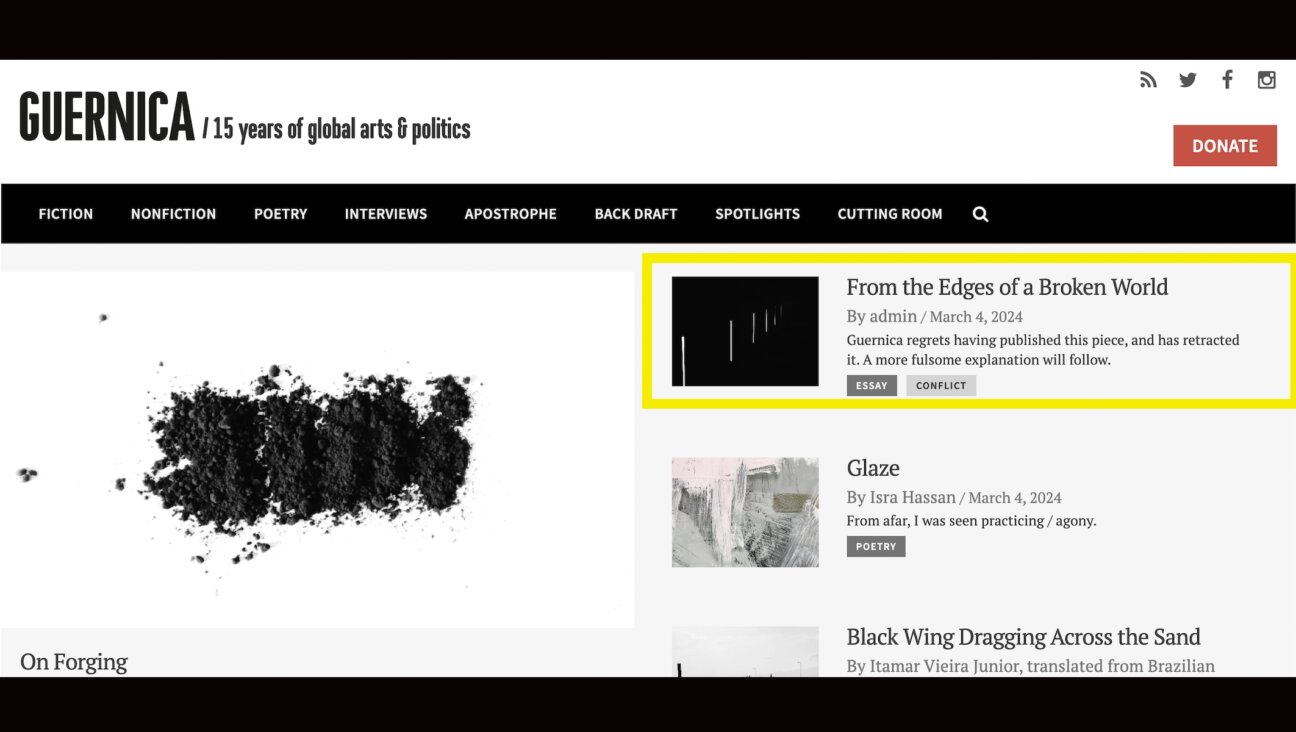Jewish Groups Backing Away From Talk of Opposing Court Pick
WASHINGTON — As rumors escalate of additional Supreme Court retirements, officials at Jewish organizations say they think it is increasingly unlikely that they will directly oppose or endorse any of the President Bush’s nominees.
Bush is expected soon to nominate a successor to retiring Justice Sandra Day O’Connor. In recent days, Washington has been abuzz with speculation that ailing Chief Justice William Rehnquist, 80, and Justice John Paul Stevens, 85, will soon retire, as well — leading some Jewish organizations to conclude that they must pick their battles carefully.
Some of the more liberal Jewish organizations are gearing up for a possible fight to oppose nominees whom they might find particularly objectionable. But even leaders of these groups say it is unlikely that they will mobilize an all-out grass-roots campaign to oppose a Bush nominee.
In all likelihood, officials at Jewish organizations say, their involvement will be limited to sending letters to the Senate, underscoring concerns about specific views or past rulings of nominees.
“A nominee will have to be outside the judicial mainstream for us to oppose him or her,” said Marc Pelavin, associate director of the Washington-based Religious Action Center of Reform Judaism. The center has been more outspoken than most other Jewish groups in opposing some of Bush’s nominees to the federal bench. Pelavin said that the RAC, which has opposed four of Bush’s appellate court nominees, considers Supreme Court Justice Antonin Scalia — the conservative judge that President Bush indicated is a presumptive mold for future nominees — as being well within the judicial mainstream.
Pelavin said that Scalia, who opposes abortion rights and is far to the right of Jewish organizations on most church-state issues, “fits that category of someone who is really not that extreme.”
The National Council of Jewish Women has consistently spoken out against lower-court nominees who oppose a woman’s right to choose, characterizing abortion as a “defining issue.” But the organization’s president, Phyllis Snyder, told the Forward that abortion would not be a litmus test for the organization and that the NCJW would also consider other concerns regarding constitutional rights.
Since Bush took office in 2001, the women’s council has opposed 21 of his judicial nominees. Only a handful of the other Jewish groups took a position on any of the president’s 230 nominees for the federal bench. When they did, however, it was almost always on one key issue: church-state separation. Officials at several major national Jewish organizations said it was the only issue this time around that could possibly galvanize many Jewish groups to oppose a Bush nominee.
At the very least, it is likely to be the number-one issue about which Jewish groups urge the Senate to grill nominees.
“There are [conservative] organizations and people in Congress now who are seriously talking about taking legal measures to preserve America’s Christian heritage,” said Marc Stern, general counsel of the American Jewish Congress. “Clearly anything of that kind would be a trip-wire for everybody in the American Jewish community,”
Most groups would oppose someone who is committed to overturning the Supreme Court ruling that bans prayer in public schools, Stern said. However, it is unlikely that Bush will appoint a nominee who holds such an extreme view.
Evaluating a nominee’s views on church-state issues can pose tricky questions. Take Alberto Gonzales, the recently appointed attorney general and friend of Bush.
Some conservative groups dominated by Christian activists are already opposing Gonzales as a possible choice for the Supreme Court, arguing that he’s too moderate on abortion. And on most issues, Jewish groups would prefer Gonzales to many other presumed candidates mentioned in the press. But Jewish organizations would have grave reservations about his positions on the role of religion in the public square.
Gonzales was White House counsel when the Bush administration in 2003 joined the Salvation Army in opposing a lawsuit by more than a dozen of its New York employees, challenging the organization’s new practice of discrimination on the basis of religion. The workers challenged attempts by the Salvation Army to require employees to divulge information about their faiths, including the churches they attended. Gonzales, as White House counsel, also vigorously defended Bush’s controversial faith-based initiative.
“I am sure that if he were the nominee, we would have questions to ask about those cases,” said a senior official with a national Jewish agency. But would these cases be enough to all-out oppose Gonzales? “Probably not,” another Jewish official said on condition of anonymity. Gonzales would pass the Scalia test easily, the official explained.
Church-state questions become even trickier with presumed candidate Michael McConnell, a Bush appointee to U.S. Court of Appeals for the Tenth Circuit who was confirmed in 2002, with the support of many conservatives and some leading liberal law professors. “McConnell is a mixed bag” on religion and state, the AJCongress’s Stern said. McConnell, a 50-year-old former law professor, has urged a constitutional amendment that would permit religiously affiliated agencies to participate in tax-supported benefit programs, and has written that religious activities should be given “equal access to public benefit.” At the same time, he has made clear that he supports the funding of religious activities only if such programs give no advantage to religion in general, or to any specific religion. He is also opposed to prayer in public school classrooms and holds stringent positions defending the free exercise of religion.
Nathan Diament, director of the Orthodox Union’s Washington-based Institute for Public Affairs, said that McConnell could be a reasonable compromise candidate for the Jewish community as far as church-state issues are concerned. Some officials with liberal Jewish groups cautiously agreed, but said that liberal Jewish groups would be hard pressed not to oppose him — because of his staunch opposition to abortion rights.
McConnell is one of the nation’s leading advocates for reversing the Supreme Court’s 1973 landmark Roe v. Wade ruling, which legalized abortion. He once called the legal reasoning behind it an “embarrassment.”

I hope you appreciated this article. Before you go, I’d like to ask you to please support the Forward’s award-winning journalism this Passover.
In this age of misinformation, our work is needed like never before. We report on the news that matters most to American Jews, driven by truth, not ideology.
At a time when newsrooms are closing or cutting back, the Forward has removed its paywall. That means for the first time in our 126-year history, Forward journalism is free to everyone, everywhere. With an ongoing war, rising antisemitism, and a flood of disinformation that may affect the upcoming election, we believe that free and open access to Jewish journalism is imperative.
Readers like you make it all possible. Right now, we’re in the middle of our Passover Pledge Drive and we need 500 people to step up and make a gift to sustain our trustworthy, independent journalism.
Make a gift of any size and become a Forward member today. You’ll support our mission to tell the American Jewish story fully and fairly.
— Rachel Fishman Feddersen, Publisher and CEO
Join our mission to tell the Jewish story fully and fairly.
Our Goal: 500 gifts during our Passover Pledge Drive!























